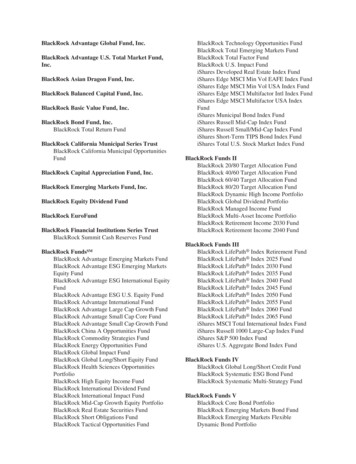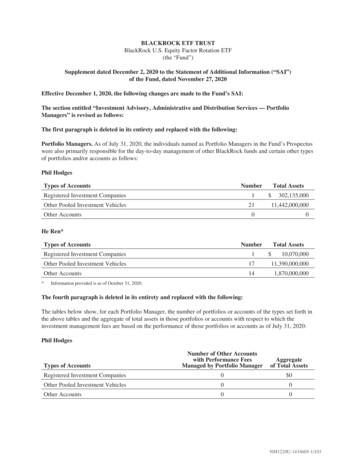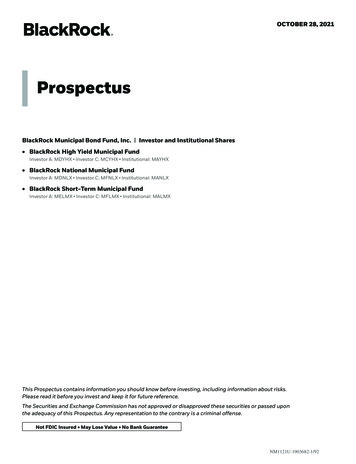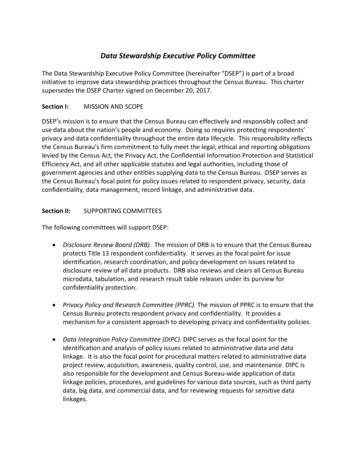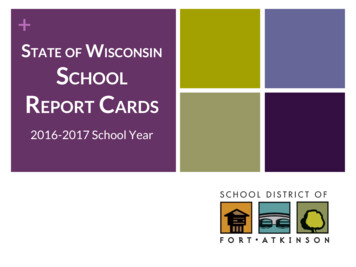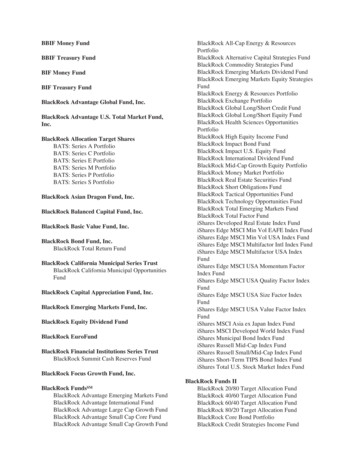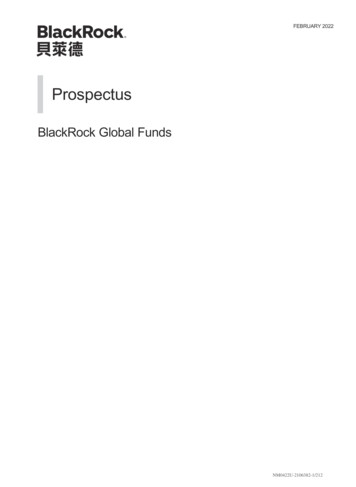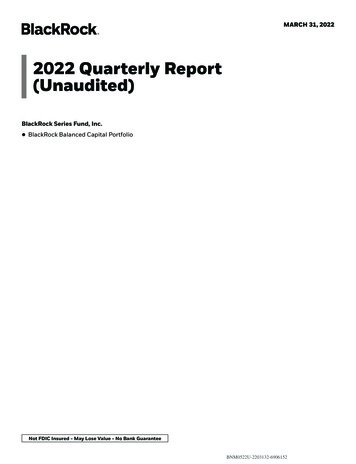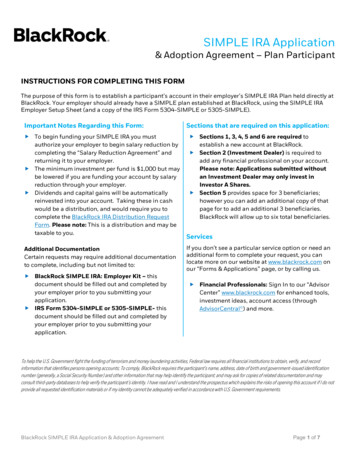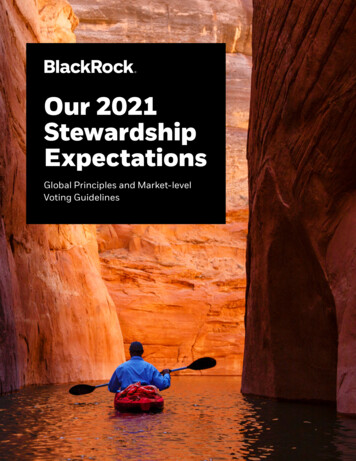
Transcription
Our 2021StewardshipExpectationsGlobal Principles and Market-levelVoting Guidelines
ContentsSection PageExecutive summary 3Engagement and voting 4Our expectations for 2021 6What’s new, what’s changed 9Our policy changes explained 12Our policies in action 15Conclusion 21Appendix 22
ExecutivesummaryEach year, BlackRock Investment Stewardship (BIS)reviews and updates our Global Principles andmarket-specific voting guidelines. The rationalefor any change is to ensure that our policies arealigned with our commitment to pursuing long-termfinancial returns for our clients as shareholders.We are pleased to share with you the changes wehave made for the coming year and the full set ofupdated principles and voting guidelines. Theupdates are the natural next step following on fromthe commitments BlackRock made this past January.Our Global Principles set out our stewardshipphilosophy and our views on corporate governanceand sustainable business practices that supportlong-term value creation by companies. Our marketlevel voting guidelines provide detail on how weimplement the principles taking into considerationlocal market standards and norms. Together theyform the basis for our stewardship activities,including thought leadership, company engagement,and holding companies accountable by voting onmanagement and shareholder proposals.Key changes in our policies address boardquality; the transition to a low-carbon economy;key stakeholder interests; diversity, equity andinclusion; alignment of political activities withstated policy positions; and shareholder proposals.The events of this year have intensified ourconviction that sustainability risk — and climaterisk in particular — is investment risk. Therefore,together with updates to our policies on governancefactors, we have made several notable changes toour policies on environmental and social factors.These changes reflect our continuing emphasison board effectiveness alongside the impact ofsustainability-related factors on a company’sability to generate long-term financial returns.The updates to our policies reflect efforts to continuously strengthen ourstewardship practices, as well as a number of specific factors, including: The demonstrated impact that sustainability-related factors can have on a company’s ability to generatelong-term risk-adjusted returns; The shift we expect to see by companies to align their underlying business models with the goal of limitingglobal warming to well below 2 degrees Celsius and reaching net zero greenhouse gas (GHG) emissionsglobally by 2050; and The application of our latest insights on the impact voting has on corporate behavior.3BlackRock Investment Stewardship
Engagementand votingThe impact of votesagainst directors and forshareholder proposalsWe are a long-term investor onbehalf of our clients. We groundour analysis and voting decisionson achieving the outcomes mostaligned with our clients’ long-termeconomic interests.We engage on financially material, business relevantissues — including governance, sustainability,and long-term performance — with more companiesthan any other firm in the industry. Engagementis core to our stewardship efforts as it enables us toprovide feedback to companies and build mutualunderstanding about corporate governance andsustainable business practices.From July 1, 2019 to June 30, 2020, we engagedwith over 2,000 companies and held over 3,000engagements — both a record number and anincrease of more than half over last year — covering61% by value of our clients’ equity investments.4BlackRock Investment Stewardship Where we believe companies are not movingwith sufficient speed and urgency, our mostfrequent course of action will be to hold directorsaccountable by voting against their re-election.Over the same period, we voted against 55directors/director-related items on climate-relatedissues.1 This is a tool available to us in virtuallyevery market we invest in on behalf of our clients Our data, discussed in more detail below, tells usthat voting against directors is effective: 83% ofthe time our votes against directors in the FTSE350 over remuneration concerns resulted inrevisions to pay policies within 12 months 41% of companies where we voted againstdirectors for diversity reasons in 2019 increasedtheir board diversity in the following yearVoting for impact Our votes against directors on pay led to changesby over 80% of companies Our votes against directors on diversity led toimprovements by more than 40% of companies Companies responded to 75% of shareholderproposals that attracted over 30% support
In preparation for this annual policy review,BIS measured the impact on U.S. corporatebehavior of shareholder proposals addressingenvironmental and/or social issues on theirshareholder meeting agenda that received30% or more votes in favor, a relatively highlevel of support.Our findings show that: For shareholder proposals that received30-50% support, 67% resulted in companiesfully or partially meeting the ask of the proposal For shareholder proposals that received over50% support, 94% resulted in companies fullymeeting the ask of the proposalFor 2021, we are askingcompanies to demonstrate:Board and workforce diversity consistentwith local market best practiceAn understanding of key stakeholdersand their interestsPlans to align their business with the globalgoal of net zero GHG emissions by 20505BlackRock Investment Stewardship
Our expectationsfor 2021While BIS has been engagingwith companies for several years2on sustainability issues, this pastJanuary, BlackRock wrote toclients about the clearer linkbetween sustainability factorsand investment risk and returns.440We signaled our intention to engage more deeplyand more often with companies in carbon-intensivesectors on climate-related business risks andopportunities as the world addresses the transitionto a lower carbon economy.Companies our expandedfocus universe will includein 2021In the year to June 30, 2020, we focused on auniverse of 440 carbon-intensive companies,representing approximately 60% of the global scope1 and 2 emissions3 of the companies in which ourclients invest. Of these 440 companies, in additionto voting against 55 directors, we put 191 “on watch”,meaning they risk votes against directors in 2021unless they demonstrate significant progress on themanagement and reporting of climate-related risk.Beginning in 2021, our expanded focus universe willcover more than 1,000 companies4 that represent90% of the global scope 1 and 2 emissions of thecompanies in which our clients invest.6BlackRock Investment StewardshipCarbon-intensive companiesincluded in our 2020 focusuniverse1,000 We communicated our position throughout thepast year and expect companies to demonstratehow climate and sustainability-related risks areconsidered and integrated into their strategy.If a company does not provide adequate publicdisclosures for us to assess how material risksare addressed, we will conclude that those issuesare not appropriately managed and mitigated.This perspective has applied to our voting onmanagement and shareholder proposals sinceJuly 1, 20205 and is reflected in the key updatesto our policies set out below.
In practiceThese updated stewardship principles and voting guidelines are informed by the developments we have seenin 2020 and how they have impacted the operating environment for every company as we head into 2021.They mark a shift in our approach to shareholder proposals and reinforce our expectations of boards in theiroversight and support of management that will be seen in our voting in the coming year.Shareholder proposalsWe see voting on shareholder proposals playingan increasingly important role in our stewardshipefforts around sustainability. Accordingly, wherewe agree with the intent of a shareholder proposaladdressing a material business risk, and if wedetermine that management could do better inmanaging and disclosing that risk, we will supportthe proposal. We may also support a proposal ifmanagement is on track, but we believe that votingin favor might accelerate their progress. As a longterm investor, BIS has historically engaged to explainour views on an issue and given management ampletime to address it. However, given the need forurgent action on many business relevantsustainability issues, we will be more likely to supporta shareholder proposal without waiting to assess theeffectiveness of engagement.Climate riskWe ask explicitly that the companies in our expandedfocus universe disclose a business plan aligned withthe goal of limiting global warming to well below2 degrees Celsius, consistent with achieving netzero global GHG emissions by 2050. Over thesecond half of 2020, we initiated engagement with110 companies based in emerging markets or insectors, such as financial services, that are notdirectly carbon-intensive but have significantclimate risk inherent in their business model.Since July 1 of this year, weare supporting more E and Sshareholder proposalsDirector accountabilitysince July 1, 2020689% of E proposals supportedShareholder proposalsFor 8Against 150% of E and S proposals supportedFor 117BlackRock Investment StewardshipAgainst 11We have voted against over 1,2007 directors on arange of governance and sustainability-related issues.Since July, there have been 22 environmental andsocial proposals on issues like climate, deforestation,and diversity, equity, and inclusion put to a vote atshareholder meetings. Our new approach meantwe supported 11 of these proposals, or 50%, whichwe believed were aligned with long-term value.We also supported 31 G proposals out of 113 (27%).
Key stakeholder interestsLobbyingWe ask that companies report on how they havedetermined their key stakeholders and consideredtheir interests in business decision-making. We alsoask that companies effectively address adverseimpacts that could arise from their business practicesand mitigate material risks with appropriate duediligence processes and board oversight. Beginningin 2021, we are prioritizing a focus universe ofapproximately 150 companies whose businesspractices may have resulted in adverse impactsor reflect insufficient management of ‘social’sustainability risks.We will now seek confirmation from companies,through engagement or disclosure, that theircorporate political activities are consistent with theirpublic statements on material and strategic policyissues. Moreover, we expect companies to monitorthe positions taken by trade associations of whichthey are active members on such issues forconsistency on major policy positions and to providean explanation where inconsistencies exist.Diversity, equity,and inclusion (DEI)We are raising our expectations, in the contextof regional norms, on board and workforce ethnicand gender diversity. In our view, diverse personaland professional experiences support the diversityof mindset that contributes to board effectiveness.This view aligns with our conviction that tone fromthe top matters as companies aim to developworkforces that more closely resemble thecustomers and communities they serve.For example, in the UK, we expect companies toadopt the recommendations of the Parker andHampton-Alexander reviews. We also believe thatan inclusive, diverse, and engaged workforcecontributes to business continuity, innovation,and long-term value creation. In the U.S., we areasking companies to disclose the diversity of theirworkforce, including demographics such as race,gender, and ethnicity through the disclosure ofEEO-1 data, as well as the actions they are takingto advance DEI and support an engaged workforce.8BlackRock Investment StewardshipBoard qualityWe are raising our regional expectations fordirector independence and director capacity toserve, reflecting our reliance on strong, engaged,and effective boards to look after investors’ longterm economic interests. For example, in Asia weare asking companies to identify a lead independentdirector who will, as part of their responsibilities,engage with shareholders.In terms of our own governance, we made acommitment to transparency in our stewardshipefforts in January. Since then we have publishedover 50 voting bulletins, initiated a global quarterlyengagement summary listing every company engagedand the topics discussed, and moved from annual toquarterly voting disclosure including a rationale forkey votes. We also published eight position papersexplaining our approach to engagement withcompanies on a number of sustainability issues.Having held ourselves to a higher standard fortransparency in stewardship, we aim to continueto raise the bar in the coming year.Early in 2021, we will release our engagementpriorities and supporting key performance indicatorsfor the year. We will also release new commentariesoutlining our perspectives on companies’ impactson natural capital — the environment beyond climate— and their impacts on people, including customers,employees, suppliers, and communities.
What’s new,what’s changedThis year, on the back ofBlackRock’s January 2020commitments to put sustainabilityat the heart of everything we do,we conducted a thorough reviewof our expectations of companies.Our revised Global Principles and voting guidelinesmark several key changes in our expectations acrossenvironmental, social and governance factors,as well as changes in how we will hold boards andmanagement accountable in our voting.We will continue to engage where it matters most,on the material risks and business practices thatsupport sustainable long-term value creation.We will emphasize company disclosures and whatthey reveal about underlying business practicesand long-term plans. We will focus on board qualityand effectiveness, holding directors accountableif company practices or disclosures fall short. And wewill engage and vote on a case-by-case basis, takinga pragmatic approach as aligned with our clients’long-term economic interests.9BlackRock Investment StewardshipEarly next year, we will provide further detail aboutour expectations of companies. This will includeour revised engagement priorities and supportingcommentaries explaining our approach toengagement on each of these key themes.Our principles and practices develop over time andare informed by the feedback we get from clientsand companies, market developments, researchand insights published by thought leaders, andobservations and analysis by BlackRock specialists.This year, BIS analysed the voting tools we use tounderstand how companies respond to the differentsignals sent through shareholder votes. Our analysisis described in further detail in the following pagesand informs our evolving approach.
Measuring the effectiveness ofvoting on E&S shareholder proposalsWe investigated the relationship between high levels of support for shareholder proposals and subsequentcompany action.8 Using Proxy Insight data, we reviewed 74 E&S shareholder proposals from the last threeyears that received support of 30% or more. We divided this 74-proposal universe into two categories —those that received between 30-50% support (58 proposals), and those that received more than 50%support (16 proposals) to further analyze whether companies fully met the request of the proposal,partially met the request or took no action.9Analysis of E & S shareholder proposals2017 - 26%31% Fully met Partially met16 50%support94% No actionSource: Proxy Insight, BIS analysis. Percentages are rounded to the nearest whole number.*July 1, 2017 – December 31, 2019 (not including full 2020 N-PX reporting year)Our analysis finds that companies tend to meet the request made in a shareholder proposal if itreceives significant support, regardless of whether or not the proposal passes. Our analysis alsoconfirmed that the proposals on which companies acted addressed material business risks.10 BlackRock Investment Stewardship
Measuring the effectiveness of votesagainst directors for governance issuesWe analyzed the impact of our votes against directors because of concerns over executive compensationpolicies in the UK and insufficient board diversity in the U.S. Our analysis finds that voting against directors,when we make clear to the company our rationale and expectations, is an effective tool for encouragingpositive outcomes.Executive compensation analysisWe assessed the year-on-year changes to our votes taken against directors of companies in theFTSE 350 over concerns about remuneration in the three years from July 2017 to June 2020.We only voted against a company’s directors over remuneration concerns in consecutive yearsin 17% of cases. The remuneration concerns we raised were substantively addressed by83% of companies when we held a director accountable the prior year.Board diversity analysisWe reviewed outcomes at companies in the Russell 3000 over the last two years10 where wevoted against director elections due to inadequate gender diversity on the board. In the U.S.we expect boards to have, in addition to other aspects of diversity, at least two women directors.11Nearly 41% of companies where we voted against directors for diversity reasons in 2019improved their board diversity by 2020.11 BlackRock Investment Stewardship
Our policychanges explainedWe are refining our expectationsof boards and managementWe aim to be a constructive and supportivelong-term shareholder. We look to boards andmanagement to consider their shareholders —our clients — and other stakeholders as theymake the decisions that shape their companies.At BlackRock, we remain firmly convinced that soundcompany governance — underpinned by a capable,well-functioning board — is integral to our clients’long-term economic interests in the companieswe invest in on their behalf. In a well-governedcompany, the board provides effective oversightof management such that management is aware ofand mitigating both idiosyncratic and systemic risks,and capitalizing on strategic opportunities to betterposition the company for the future.We modified our principles to be clear that weexpect boards to shape and monitor management’sapproach to material sustainability factors in acompany’s business model. We will hold directorsaccountable where business practices or disclosuresfall short of our expectations. This is not a newposition, but we want to be explicit and clear aboutour views on board responsibility for sustainabilityand director accountability.12 BlackRock Investment StewardshipIndependence is of paramount importance to a wellfunctioning board, and it is clearly linked to longterm value creation.12 We clarified our expectationsof independence. In Asia, we are strengthening ourexpectation that companies name a Lead IndependentDirector whose duties include meeting with minorityinvestors to ensure their voice is heard.We have a long-standing expectation in mostmajor markets that board composition shouldreflect diversity of personal characteristics,including ethnicity and gender, as well asprofessional experience. We strengthened ourfocus on ethnic and gender diversity on largecompany boards, with an eye toward more votingaction against boards not exhibiting diversity in2022. In the U.S., we are asking companies todisclose, amongst other things, data on the raceand ethnicity of their board members to enableinvestors to make informed diversity assessments.We will also look more closely at average directortenure, as we seek a balance between the knowledgeand experience of seasoned directors and the freshperspective of newer directors. In the UK, we expectcompanies to adopt the recommendations of theParker and Hampton-Alexander reviews. In moredeveloped Asian markets, we are also introducingminimum gender diversity expectations and willbegin to take voting action against larger companiesfailing to meet local market expectations.
Finally, our approach to compensation askscompanies to demonstrate that executivecompensation is clearly linked to long-termvalue creation. Globally, our analysts alwaysconsider company context in assessing whethercompensation policies and outcomes areappropriate. In Europe, we are asking thatcompanies explicitly consider outcomes forall their stakeholders when making executivecompensation decisions.We are evolving our approachto shareholder proposalsIn most markets, eligible shareholders have the rightto make proposals to be voted by shareholders at acompany’s annual or extraordinary general meeting.They address a range of topics, including governancereforms, capital allocation, and the management anddisclosure of environmental and social risks.We evaluate each proposal on its merit, witha singular focus on long-term value creation.We consider the economic relevance, materialityand urgency of the issue raised, and we considerthe legal effect of the proposal in advising orbinding company management.Where we agree that the issue and intendedoutcome of a proposal are consistent with longterm value creation, we expect the board andmanagement to meet the spirit of the request.Where our analysis and engagement indicatea need for improvement in a company’s approachto an issue, we will support shareholder proposalsthat are reasonable and not unduly constrainingto management.13 BlackRock Investment StewardshipWe are refining our expectationsfor how companies manageclimate riskIn January, we asked companies to demonstratethey were adequately managing climate and othersustainability-related risks by reporting in linewith the Task Force on Climate-related FinancialDisclosures (TCFD) framework and metrics providedin the Sustainability Accounting Standards Board(SASB) standards.We are firmly supportive of these two disclosureapproaches and have been encouraged by rapidindustry adoption as well as progress towardglobal convergence in sustainability standards,as discussed in our recent position paper. 13We welcome recent moves by policy makersand regulators in countries like the UK andNew Zealand that recently mandated TCFDreporting, and in others that recommenddisclosure aligned with the TCFD and SASB.In our principles, we clarify our expectationthat companies disclose a plan for howtheir business model will be compatible witha low-carbon economy, that is, one where globalwarming is limited to well below 2 degrees Celsiusand consistent with a global aspiration of net zeroGHG emissions by 2050. This is not a new ask —it is consistent with the TCFD recommendations,on which we have been engaging companies forseveral years.
We are broadening the universe of focus companiesgiven the significant physical and/or transitionclimate-related risk in their business. The extendeduniverse of over 1,000 companies includes the440 names on our 2020 focus list. This represents90% of the global scope 1 and 2 emissions of thecompanies in which our clients invest globally.We will step up our engagement efforts with thisuniverse and consider accelerated voting actionsshould the substance of companies’ climate-relatedcommitments and disclosures not meet ourexpectations.In January 2021, we will provide a more holisticcommentary on our approach to natural capital.This will deepen our perspectives and expectationson promoting biodiversity and counteractingdeforestation. These are topics we actively engageand vote on, particularly in fragile parts of the globalecosystem such as the Amazon Basin and rainforestrich countries in Southeast Asia. It will also addresshow we expect affected companies to manage thescarce water and energy resources on which theydepend to avoid negative impacts that could impairtheir ability to operate.We also recognize that for many carbon-intensiveWe are also keenly aware of the need for companiescompanies the credibility of their commitments tomanage climate and other sustainability risks maybe undermined by their involvement in or affiliationswith efforts that seek contradictory public policy aims.For this reason, we enhanced our disclosurerequests in relation to a company’s politicalactivities. We will evaluate whether there isalignment between a company’s public statementson policy issues that are material to its strategy andits corporate political activities, including those of thetrade associations where they are active members.to translate words into action in looking after theinterests of all their stakeholders, particularly in thecontext of the COVID-19 pandemic. We are moreconvinced than ever of the words from Larry Fink’s2018 letter to CEOs: “Without a sense of purpose, nocompany, either public or private, can achieve its fullpotential. It will ultimately lose the license to operatefrom key stakeholders.”We are intensifying ourengagement on otherenvironmental and social issuesWe are firmly convinced that climate risk — physicaland transition risk — presents one of the mostsignificant systemic risk to the long-term value ofour clients’ investments. But we are also aware thatother environmental risks can be material for manycompanies. For this reason, we continue to engageon a wide range of environmental topics, as outlinedin our Approach to engagement with the palm oilindustry and our Approach to engagement withagribusiness companies on sustainable businesspractices commentaries.14 BlackRock Investment StewardshipWe have long engaged with companies on purpose,stakeholder considerations, and human capitalmanagement. When we update our engagementpriorities, we will provide a more holistic set ofexpectations regarding how companies monitorand manage their impacts on people, includingtheir employees, suppliers, customers,communities, indigenous peoples and otherstakeholders. We will prioritize engagement withapproximately 150 focus companies whose businesspractices have resulted in adverse impacts andexposure to material business risks. Additionally,we will raise our expectations that companies takeaction to advance equity of opportunity within theworkforce and make relevant SASB-aligneddisclosures. In the U.S., we will ask companies todisclose the diversity of their workforce, includingdemographic information such as race, gender,and ethnicity.
Our policiesin actionWe continue to be a supportive long-term shareholderto those companies that demonstrate soundcorporate governance and sustainable businesspractices. But as we have explained in the priorsections, we will hold companies accountable throughour voting if they fall short of our expectations.We depend on companies to provide shareholderswith the disclosures on the range of material,business relevant issues that enable them to assesspractices, performance, and progress. We aim to betransparent about our approach and have providednumerous examples of engagement and high profilevotes in Our Approach to Sustainability, our AnnualStewardship Report, and Global Quarterly Reports.The cases below explain how we have supportedrecent shareholder proposals to signal concerns aboutthe sustainability of a company’s business practices.Where we agree with the intent of a shareholderproposal associated with a material business risk,we will be supportive if we think management couldbetter manage and disclose that risk.Voting on directors is, in our view, one of our mostimportant responsibilities as leadership from theboardroom is critical to a company’s long-termsuccess. It is also a signal of support or concernavailable globally. In the cases that follow, we alsoprovide recent examples of our holding directorsaccountable through our voting when they do not seemto be acting in shareholders’ long-term interests.15 BlackRock Investment StewardshipVoting for shareholderproposals that addressmaterial business risksSince July 2020, we have supported eight out of nineenvironmental proposals and three out of 13 socialproposals globally.14 This reflects our new approachin action and is an indication of our direction oftravel as we go into the peak shareholder meetingseason in the second quarter of 2021.Our refreshed approach to shareholder proposalsis consistent with and informed by analysis we havedone into their effectiveness as a tool for advancingthe desired business practices by companies.As always, we continue to follow a case-by-caseapproach in assessing each proposal on its merits.Since July 1, we have supported four shareholderproposals at three companies — AGL, Aena andChr. Hansen — asking companies to produce climatetransition plans consistent with our expectationsof TCFD-aligned disclosure.AGL Supporting a shareholderproposal for a plan for retiringcoal-fired power by 2035AGL is Australia’s largest power company and isalso its largest single producer of CO2 emissions.
AGL has committed to achieve net zero carbonemissions by 2050 and is a market leading investorin renewable energy, including solar, wind, andhydro. We supported a shareholder proposalasking the company to produce a plan for retiringits coal-fired power plants by 2035 in line with a1.5-degree global warming scenario. While thecompany has been responsive to investor feedbackand has steadily improved its disclosures, includingupdating its most recent TCFD reporting to includea 1.5-degree scenario framework, we believe thereis room for improvement. Moreover, we support themanagement’s efforts to transition their energy mixtoward sustainable sources, but we are concernedWe also supported proposals seeking enhanceddisclosure of political activities. Some proposalssought general improvements in disclosures whileothers focused specifically on how a companyensured that the strategically important policypositions of its trade associations were alignedwith its own statements. In some cases, like Origin,we see progress on monitoring misalignment, butwork remains to minimize the risk of materialcontradictions in positions, particularly on theenergy transition. Some companies, like Cintas,provide no information on their political activitiesand in our view require signi
Our Global Principles set out our stewardship philosophy and our views on corporate governance and sustainable business practices that support long-term value creation by companies. Our market-level voting guidelines provide detail on how we implement the principles taking into consideration local market standards and norms. Together they
